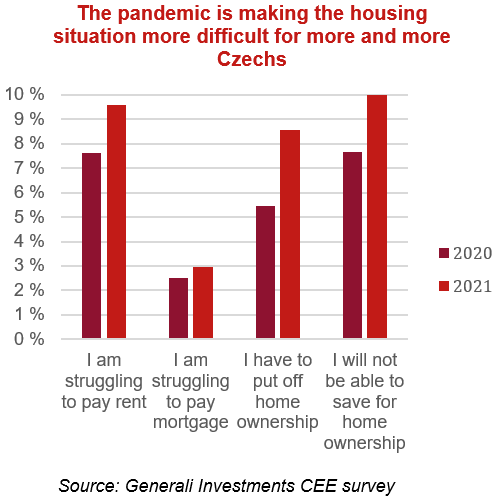Covid and Rising Prices Destroy Czechs' Dreams of Their Home Ownership
20 September 2021
More and more Czechs are accepting the fact that they will live in rented accommodation. While in 2020, 62% of people feared that they would not reach their home ownership due to the coronavirus crisis, now it is 77%. The number of people who prefer rental housing has increased from 8% to 10%. Young people under the age of 26 also have moved back to their parents more during the pandemic, while in autumn 2020 15% of them lived with their relatives, this year it is already 23%.

Due to the pandemic, the number of people who have problems paying rent also increased – while last year it was 8% of tenants, this year already it is 10% of them. This follows from the second repetition of an extensive survey mapping the financial situation of Czechs with regard to housing carried out by Generali Investments CEE through the Instant Research application of the Ipsos agency1.
CZECH PEOPLE TRY TO SAVE MORE, BUT THEY CANNOT AFFORD THEIR HOME OWNERSHIP
 The coronavirus crisis and the related economic downturn have affected the housing situation of more than a third of people. The number of Czechs who have to postpone the purchase of real estate has risen from 5% to 9% in 2020. The number of those struggling with mortgage payments also rose slightly, from 2% to 3%. Although the number of Czechs who have a problem with paying rent has increased, the number of people asking for its reduction has decreased year-on-year. In 2020, at least 10% of respondents considered this option, so far only 4% of people have done so so far and another 1% are considering it.
The coronavirus crisis and the related economic downturn have affected the housing situation of more than a third of people. The number of Czechs who have to postpone the purchase of real estate has risen from 5% to 9% in 2020. The number of those struggling with mortgage payments also rose slightly, from 2% to 3%. Although the number of Czechs who have a problem with paying rent has increased, the number of people asking for its reduction has decreased year-on-year. In 2020, at least 10% of respondents considered this option, so far only 4% of people have done so so far and another 1% are considering it.
A total of 6 out of 10 Czechs fear that the pandemic has worsened their chances of affording home ownership. As many as 77% of people are afraid that they will not be able to buy or renovate real estate. Therefore, two thirds of them save more and put money aside, while 27% are looking for a job with a higher salary. In particular, people under the age of 26 are also moving back to their parents more. However, the number of people who no longer even think about home ownership and want to stay in rented accommodation has increased. Back in 2020, it was 8% of people, now it is already 10%.
"Housing prices have been rising steadily for several years and the coronavirus crisis has not changed anything. For many people, on the contrary, the pandemic was a significant impact on their savings or income, so some of them gave up the idea of buying their own real estate. The market is also responding to this. The trend of building projects intended not for sale but purely for rental housing continues," comments Marek Bečička, Director of Product & Real Assets Generali Investments CEE.
CZECH PEOPLE ARE WILLING TO PAY MORE FOR HOUSING
Although fewer people want to be homeowners, over 80% of people have said that the amount they are willing to pay for rent or mortgage has not changed. While in 2020 only 60% of people were willing to pay more than CZK 5,000 per month for housing, this year it is already 68%. The number of Czechs who are willing to spend for housing more than CZK 10,000 per month then increased from 22% to 28%. The average amount that people are willing to pay for housing has thus increased from CZK 8,700 to CZK 9,700 per month.
While in 2020 12% of Czechs stated that they were willing to live in a smaller flat due to the pandemic, this year only 8% of the respondents would be willing to move to a smaller one. On the contrary, the number of people willing to live in a worse location has increased from 3% to 4%. More than a third of them would even be willing to commute from another city, compared to only 21% in 2020.
"Czechs are aware that they have to spend more of their income on housing. Although they are willing to pay more for housing and usually have the means to do so, they are afraid that it will not be enough for their own housing in the future. Or they are worried that they will have to move further from the centre or even commute to work from a smaller town,” explains Bečička.
REAL ESTATE AS THE MOST POPULAR INVESTMENT
Czechs are also becoming more and more aware that it is worth investing in real estate. 85% of Czechs perceive real estate as an attractive investment. 61% of people also think that their prices will continue to rise, while 15% of respondents believe that there will be a "bubble burst" and prices will fall. 7 out of 10 Czechs would prefer direct ownership in the case of real estate investments; the remaining 30% would invest through funds or a combination of both.
"Real estate has long been perceived among the Czechs as a profitable investment. This was also shown by our Generali Lion's share project, in which 15% of people described investing in real estate as the most advantageous way of saving money, making it the most popular investment product in the Czech Republic. In addition, the current situation on the market proves them right," says Bečička.
"But only few people realize that they don't have to have millions to invest in real estate. When investing through funds, it is possible to profit from the growing value of real estate even with smaller amounts, while small risks are reduced for small investors. It is mainly a matter of greater portfolio diversification, quality selection of real estate and their subsequent professional management. In addition, they are not directly burdened by some cost items, such as the costs of reconstruction and loss of income in cases where tenants leave and they are looking for new ones for a longer time," concludes Bečička.
NOTES FOR EDITORS
ABOUT THE SURVEY
The survey was conducted on a representative sample of 1,050 respondents from all regions of the Czech Republic aged 18-65 in September 2021. The data collection was performed through the Instant Research application of the Ipsos agency.
1 The survey was conducted on a representative sample of 1,050 economically active respondents from all regions of the Czech Republic aged 18-65 from 3 to 9 September 2021. The data collection was performed through the Instant Research application of the Ipsos agency. The first repetition of the survey was carried out using the same method on a sample of 1,084 respondents in September 2020.


